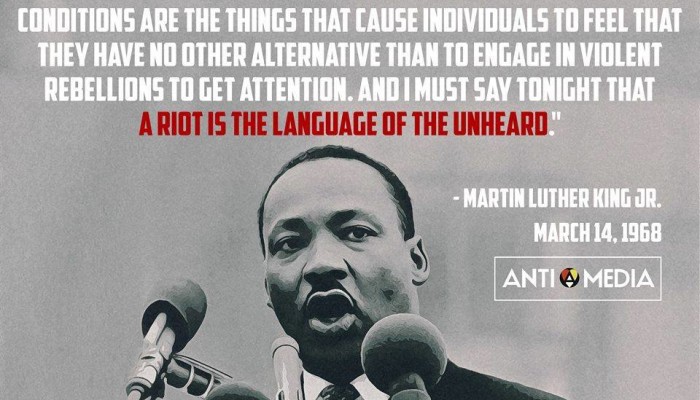
Talking to Students about the Baltimore Riots
One of my students asked me today how I feel about the riots going on in Baltimore right now. Nothing like being put on the spot at 8:30 on a Tuesday morning.
But, if you know me at all, you know that I’m not one to shy away from these questions. And this is an excellent question, for how does one feel about the rioting in Baltimore? How does one see, day in and day out, the systemic violence and hatred toward a group of people, or the death of countless Black individuals who should never have died, or the resulting protests that start peacefully but inevitably end up embodying the anger and resentment and, most of all, fear that people in these communities feel and then express thoughts and feelings about these incidents in coherent phrases? How is one supposed to do that?
It makes me sad. I hate it when my students say that. I ask, “How did this passage make you feel?” or, “What is the tone the author is using here?” They say: sad. I hate it because it’s too easy, but also because it’s too distant. Sad is something other people feel, something a child points to and notices. It might be sad, but it is also outrageous, devastating, heart-breaking, unthinkable, untenable. But I want to maintain a bit of distance from this, for now at least, and especially with my students. I’m not sure why, but that feels right at this point. So, for now, it makes me sad.
It makes me sad that we live in a culture of systemic violence and racism. It makes me sad that people think that because we elected a Black President that we now live in a post-racial society. It makes me sad that my students – many of them young, Black men themselves – are not surprised when they hear of other young, Black men being killed.
But it also makes me sad when people point to rioters and say, “See? They’re hoodlums. They don’t know how to act. No wonder police shoot at them. Be peaceful. Can’t you see that you need to be peaceful to exist in this society?”
I cannot be surprised about riots following some act of violent injustice, nor can I condemn them. Violence begets violence; we’ve seen it time and time again. Kids bullied on the playground become bullies themselves. A little boy who watches his father beat his mother might grow up to follow in his father’s footsteps. We don’t call it the “cycle of abuse” for no reason. So why are we surprised when the violence of a young person murdered unjustly begets the violence of riots when justice is not served?
Now, don’t get me wrong: I do not condone the destruction of property and the injury of people. How can I? But how can I say that their anger is unjustified or that this physical embodiment of their outrage is surprising? It’s not.
In March of 1968, Dr. Martin Luther King, Jr. said, “It is not enough for me to stand before you tonight and condemn riots. It would be morally irresponsible for me to do that without, at the same time, condemning the contingent, intolerable conditions that exist in our society. These conditions are the things that cause individuals to feel that they have no other alternative than to engage in violent rebellions to get attention. And I must say tonight that a riot is the language of the unheard.” I’m sad that his words are still relevant. I’m sad that we tend to teach racism as something that happened long ago and has long since been fixed. I’m sad that we have to continue to watch the loss of lives, and I’m sad that our justice system is broken.
So, how do I feel about the riots going on in Baltimore right now? I feel sad.
Don’t you?